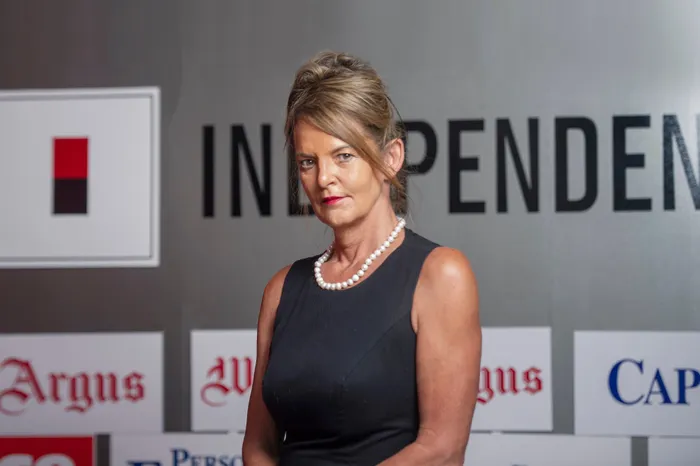Independent Media and the true meaning of press freedom
Editor's Note

Independent Media’s editor-in-chief Adri Senekal de Wet.
Image: Armand Hough/Independent Newspapers
CAROLINE James’s recent article on amaBhungane’s decision to intervene in a legal matter involving Independent Media is a disingenuous attempt to paint herself and her organisation as champions of press freedom.
However, it is both ironic and revealing that this apparent act of “solidarity” arrives wrapped in disdain, accusations, and a backhanded swipe at Dr Iqbal Survé, the chairman of Independent Media and the Sekunjalo Group.
Let me set the record straight. Dr Survé is a visionary South African entrepreneur, a trained medical doctor, and a global philanthropist who has received multiple honorary doctorates and has served in key leadership roles across international economic and media platforms. He has served as chairperson of the BRICS Business Council (South Africa), represented the country at the World Economic Forum in Davos, and remains deeply committed to building inclusive economic models that empower the majority of South Africans, not a select few.
Crucially, Dr Survé has dedicated a significant portion of his life to defending and advancing the principles of free speech and media plurality, often at great personal and financial cost. Under his leadership, Independent Media became one of the very few large-scale, black-owned media houses in the country, committed to transforming the narrative landscape of South Africa. It is precisely because of this transformation that powerful interest groups have waged a relentless campaign to discredit him and the company he leads.
Independent Media has published stories other outlets wouldn’t touch — stories about state capture, corporate corruption, banking collusion, land restitution failures, and political hypocrisy. We have given voice to the marginalised, to families of unrest victims, whistleblowers, and ordinary citizens. We have upheld the spirit and substance of media freedom as enshrined in Section 16 of our Constitution: not just the right to speak, but the right to know.
Which brings us to the real meaning of World Press Freedom Day, a day meant to honour the fundamental human right to free expression and to recognise the press as a pillar of democracy, not a tool of elite manipulation. Sadly, this spirit is being diluted by actors like amaBhungane, who present themselves as independent while evading full transparency about their funding and motives.
James fails to mention, for instance, the growing concern about amaBhungane’s financial ties to international donors and wealthy local benefactors, including links to Oppenheimer-aligned initiatives. She does not disclose that figures like William Gumede allegedly received funding from these circles, raising serious questions about ownership influence and editorial bias. For an organisation that preaches transparency, this omission is glaring.
It is also worth reminding the public that one of amaBhungane’s co-founders, Sam Sole, has previously been accused of Stratcom-style tactics, misusing investigative journalism to serve political interests and destabilise black-owned media entities. These are not idle accusations. They come from years of observation, experience, and first-hand exposure to how narrative warfare is conducted in South Africa.
In that context, James’s faux indignation that Independent Media has called out amaBhungane as “racist” or “Stratcom” is not only misplaced, it’s revealing. It reflects a belief that their organisation is beyond scrutiny, above criticism, and immune to being held to the same standards they so eagerly apply to others.
Let us be crystal clear: press freedom does not belong to a handful of NGOs funded from abroad. It belongs to the people of South Africa. It belongs to the journalists on the ground, the community papers, the investigative reporters who work without donor stipends or overseas backers. And yes, it belongs to media houses like Independent, which face daily legal and financial harassment for simply doing their job.
The case involving ARTsolar is not an isolated incident; it is part of a broader trend where powerful interests use the courts to silence journalists. We reject any form of censorship, whether it comes from corporate boardrooms or courtrooms. But we also reject opportunists who swoop in at the last minute to frame themselves as heroes while undermining the very institutions they claim to defend.
At Independent Media, we are committed to protecting the rights of our journalists, defending the integrity of our platforms, and ensuring that media freedom is not reduced to a slogan used to justify elitist capture of the narrative. We are here to serve the public interest. That includes challenging the very actors who claim to speak for the public while operating in secret.
We call on amaBhungane to disclose all their sources of funding, all potential conflicts of interest, and the real motivations behind their targeted interventions. We also remind them that media solidarity begins with mutual respect, not condescension, not character assassination, and certainly not selective advocacy.
As editor-in-chief, I am proud to stand alongside Dr Survé and the editors and journalists across our titles. We are not perfect, but we are principled. And we will continue to tell the stories that matter, no matter how uncomfortable they are for those who believe they should control the narrative. On this Press Freedom Day, let us reaffirm what real media independence looks like: it looks like accountability, it looks like truth-telling, and it looks like ownership that reflects the soul of the country, not the wallets of a privileged few.
* Adri Senekal de Wet is the editor-in-chief of Independent Media.
